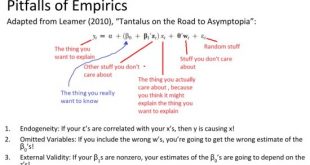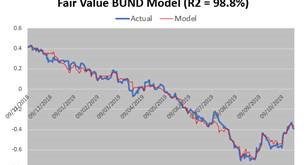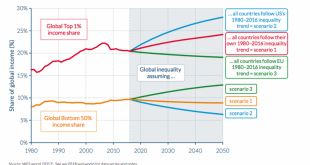Read More »
Where economics went wrong
from Lars Syll David Colander and Craig Freedman’s Where Economics Went Wrong is a provocative book designed to inspire economists to serious reflection on the nature of economics and how it is practiced. It is a book to that seeks to stimulate discussion about the current state of the discipline; it should be read by anyone who categorizes what they do as applied policy work. I agree with much – though not all – of what Colander and Freedman’s write … Reliance on mathematics has obscured...
Read More »The Great Transformation of economic theory
from Asad Zaman In the Origins of Central Banking, we discussed how the Bank of England was created in 1694 to provide funding for a war with France. The success of this institution was noted, and it was replicated across Europe, so that Central Banks came into existence to finance the nearly continuous wars between European powers that characterized the 18th Century. The 19th Century was unusual in that European powers set aside differences to create a Hundred Years of Peace (1814 to...
Read More »The pitfalls of econometrics
from Lars Syll Ed Leamer’s Tantalus on the Road to Asymptopia is one of my favourite critiques of econometrics, and for the benefit of those who are not versed in the econometric jargon, this handy summary gives the gist of it in plain English: Most work in econometrics and regression analysis is made on the assumption that the researcher has a theoretical model that is ‘true.’ Based on this belief of having a correct specification for an econometric model or running a regression, one...
Read More »Are low interest rates ‘fair value’?
The next post is interesting on different levels. First, interest rates are low and it shows that medium run changes in these rates can to quite some extent be ‘explained’ by a cocktail of: economic variables, price setting by central banks and expectation variables (mind that the model is straightforward but the variables aren’t!). This, however, does not explain why USA rates are quite a bit higher than (in this case) German rates, even when inflation, growth and unemployment in the...
Read More »Rising global income inequality is not inevitable in the future
The general decline of public capital between 1970 and 2016
DEAN BAKER |HSI COLLEGE
Bishop Dr. Joh Seer is the Founding Patriarch of the WORLD BISHOP COUNCIL FEDERATION. He is also the President of ASSEMBLIES OF CHRISTIAN (Malaysia), Chancellor of HOLY SPIRIT INSTITUTE & Chairman of online Christian Radio SUARA PROFETIK ASIA/PROPHETIC VOICE OF ASIA. Bishop Dr. Joh Seer ialah Patriarch PERSEKUTUAN APOSTOLIK & PROFETIKA ASIA & PERSEKUTUAN USKUP ANTARABANGSA .Dia juga merangkap Presiden Jemaat ASSEMBLIES OF CHRISTIAN@AOC Chancellor Kolej INSTITUT ROH KUDUS dan Pengerusi...
Read More »DEAN BAKER |HSI COLLEGE
Bishop Dr. Joh Seer is the Founding Patriarch of the WORLD BISHOP COUNCIL FEDERATION. He is also the President of ASSEMBLIES OF CHRISTIAN (Malaysia), Chancellor of HOLY SPIRIT INSTITUTE & Chairman of online Christian Radio SUARA PROFETIK ASIA/PROPHETIC VOICE OF ASIA. Bishop Dr. Joh Seer ialah Patriarch PERSEKUTUAN APOSTOLIK & PROFETIKA ASIA & PERSEKUTUAN USKUP ANTARABANGSA .Dia juga merangkap Presiden Jemaat ASSEMBLIES OF CHRISTIAN@AOC Chancellor Kolej INSTITUT ROH KUDUS dan...
Read More »Blame the policies, not the robots
from Jared Bernstein and Dean Baker The claim that automation is responsible for massive job losses has been made in almost every one of the Democratic debates. In the last debate, technology entrepreneur Andrew Yang told of automation closing stores on Main Street and of self-driving trucks that would shortly displace “3.5 million truckers or the 7 million Americans who work in truck stops, motels, and diners” that serve them. Rep. Tulsi Gabbard (Hawaii) suggested that the “automation...
Read More » Real-World Economics Review
Real-World Economics Review







